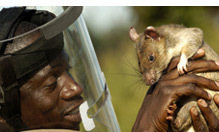by
Brendon Nafziger, DOTmed News Associate Editor | December 20, 2010

Bomb-finder and
friend (Image courtesy
Apopo)
Scientists say they've hit upon a new device for detecting tuberculosis: a three-pound African rat.
The sniffing powers of the giant African pouched rat are already used to help find landmines in war-torn countries. And now some researchers think they can help ferret out tuberculosis in sputum samples.
In a study published this month in the American Journal of Tropical Medicine and Hygiene, researchers said the foot-long rats' sensitive noses boosted the detection rate of TB by 44 percent, compared with the normal technique in developing countries, humans using microscopes.



Ad Statistics
Times Displayed: 78270
Times Visited: 2779 Ampronix, a Top Master Distributor for Sony Medical, provides Sales, Service & Exchanges for Sony Surgical Displays, Printers, & More. Rely on Us for Expert Support Tailored to Your Needs. Email info@ampronix.com or Call 949-273-8000 for Premier Pricing.
In the study, the rats sniffed out sputum samples sent from more than 10,000 patients in Tanzania. The critters were trained by being rewarded with a nibble on a banana for lingering at TB-positive samples.
The researchers said microscopy alone identified 13.3 percent of TB-positive samples, but additional screening with trained rats found 620 more infected patients. And finding more patients is key, as a tubercular patient can unknowingly infect about a dozen people a year, according to the World Health Organization.
The researchers said the technique could prove useful in the developing world, but more research is needed.
"It takes about six months to train a rat and they don't have a lot of false positives," lead researcher Alan Poling, a professor of psychology at Western Michigan University in Kalamazoo, Mich., told DOTmed News by e-mail.
Nearly 1.7 million people died from TB last year, the WHO said, with most of the deaths occurring in Africa. And fewer than half of the TB cases in sub-Saharan Africa are currently detected, according to Apopo, an organization that trains the rats to find mines and which helped run the current study.
African pouched rats (Cricetomys gambianus)have extremely sensitive noses. They're also relatively small, making them great at finding mines without setting them off. This month a batch of rats is being deployed to Colombia to help find mines left by rebels and drug gangs.

